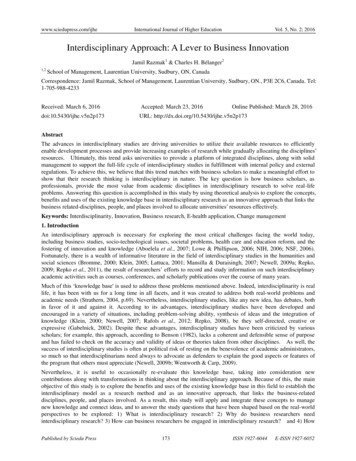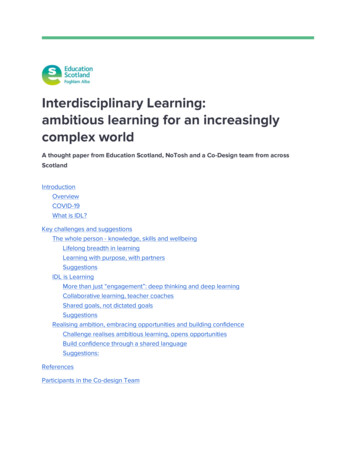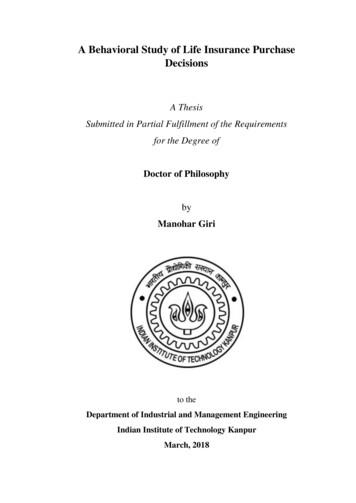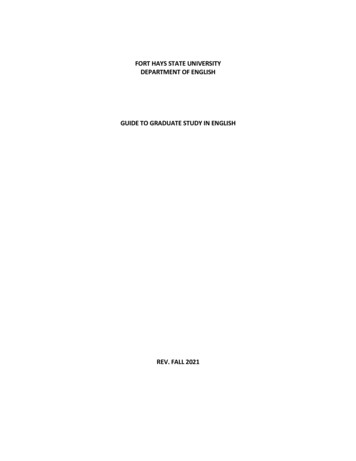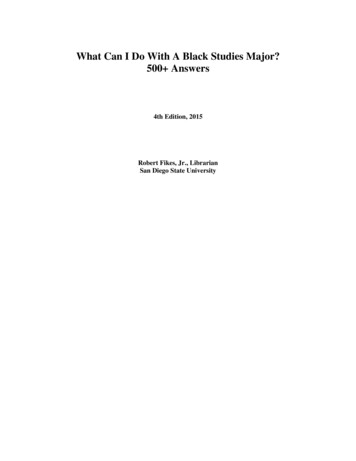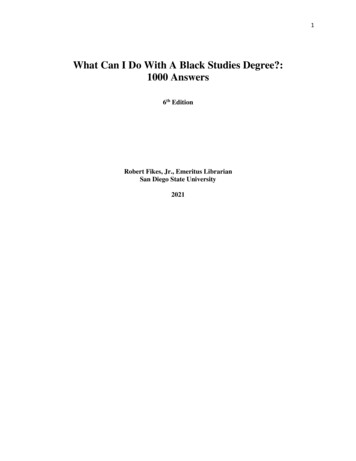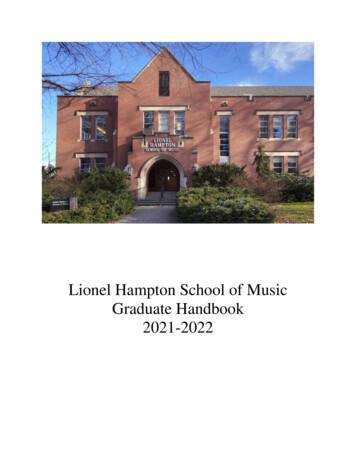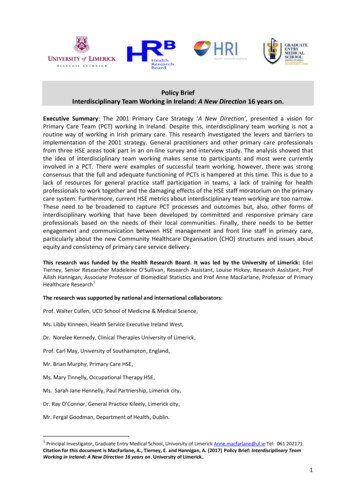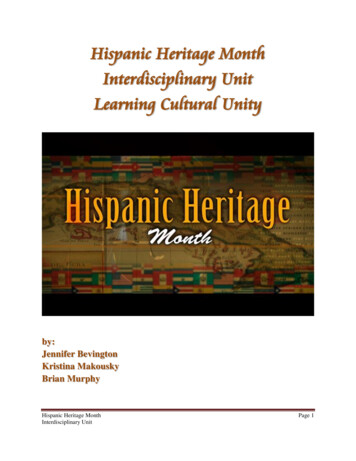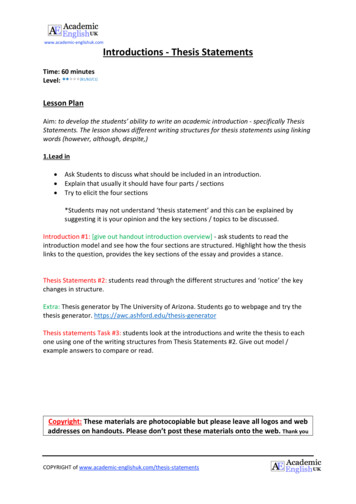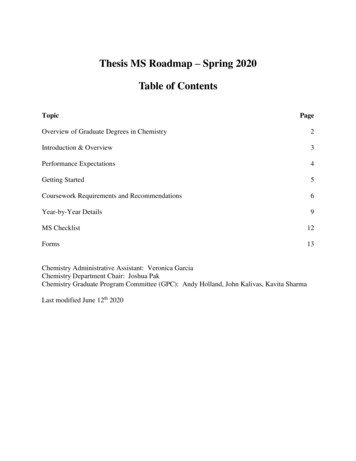
Transcription
Interdisciplinary StudiesMA: Non-ThesisGraduate ProgramHandbookLast updated July 10, 2018
Table of ContentsIntroduction .1Curriculum .1Timeline for Completion .1Internship Experience .2Examination Requirements .2Project Requirements .2Project Scope .2Faculty Advisor and Project Review Committee.3Evaluation .3Financial Support .3International Students .3Graduate Student Associations .3Graduate Student Association .3Professional Development .4Preparing Tomorrow's Faculty Program .4Pathways to Success Workshops .4Job Search .4Career Services .4Forms .4Useful Links .4Grad Faculty .5Contact Info .6Interdisciplinary Studies MA, Non-Thesis Program Handbooki
Interdisciplinary Studies MA, Non-ThesisTogether, the Graduate Student Handbook and your graduate program handbook should serve as your mainguide throughout your graduate career. The Graduate Student Handbook includes university information, policies,requirements and guidance for all graduate students. Your program handbook describes the details aboutgraduate study and requirements in your specific program. While both of these handbooks are wonderfulresources, know that you are always welcome to talk with faculty and staff in your program and in the GraduateCollege.The central activities and missions of a university rest upon the fundamental assumption that all members of theuniversity community conduct themselves in accordance with a strict adherence to academic and scholarlyintegrity. As a graduate student and member of the university community, you are expected to display the higheststandards of academic and personal integrity.Here are some resources to help you better understand your responsibilities: Academic HonestyAcademic Integrity Training - Open to all graduate students at no costPlagiarismIntroductionThe Interdisciplinary Studies MA program offers students the opportunity to design their own degree by selectingeither one of the pre-approved interdisciplinary concentrations such as Diversity & Inclusion or ProjectManagement, or two concentration areas from nearly any department at UCF. While the College of GraduateStudies offers over 200 graduate degree programs, some students may have unique interests or require tailoredtraining for a desired career. The Interdisciplinary Master’s program allows students the flexibility to define theireducational experience by choosing the content and way in which they complete the degree. The program can becompleted either full-time or part-time and participating departments offer a variety of course schedules includingday and night courses as well as online courses. The benefit of the Interdisciplinary degree is that applicants cantake advantage of the diversity of courses offered on campus and combine them in ways that meet changingworkforce and societal demands. The Interdisciplinary nature of the degree allows for it to be responsive topersonal and societal needs.CurriculumPlease visit the Graduate Catalog to see the current curriculum for our program.Timeline for CompletionThe Interdisciplinary Studies MA is a total of 33 credit hours beyond the bachelor’s. All students in the programmust choose either from the list of pre-approved interdisciplinary concentrations, such as Diversity & Inclusion orProject Management, or two disciplines/concentrations on which to base their degree. Each concentration willrequire 9 hours for a total of 18 credit hours. For the non-thesis option students will complete 9 hours of requiredcourses and 6 hours of elective courses. The program can be completed in two years if pursued full-time. For thecompletion of the non-thesis MA students choose a capstone experience: a comprehensive exam, a capstoneproject, or an internship must be completed before graduation. Please see the details for each in the sectionsbelow, but note completion of only one is required.Each student will submit a Proposed Plan of Study at the time of application. This plan outlines the specificcourses desired for the degree and alternates should schedule or enrollment issues arise. Given the complexInterdisciplinary Studies MA, Non-Thesis Program Handbook1
nature of the Interdisciplinary Studies program, in which students take courses from around the university, there isno one model that fits every student. Each plan is personal and customized.It should be noted that a formal Program of Study must be submitted before the completion of 12 credit hours andapproved by the program director, and cannot be altered solely due to poor academic performance. If courses notlisted on the Program of Study are taken without prior approval, the Interdisciplinary Studies program reserves theright to exclude those courses from your degree program. The Program of Study becomes part of your academicfile and can be changed through consultation with the Interdisciplinary Studies Coordinator. All changes must beapproved by the Program Director prior to taking the classes.Additionally, program milestones have been developed to guide students towards the successful completion oftheir degree. Students should be aware of these milestones and stay in contact with the Interdisciplinary StudiesCoordinator on a regular basis.Non-Thesis Milestones (Meet with Interdisciplinary Studies Coordinator): 0-9 Hours: Meet to review Planned Program of Study (in application) and create personal timeline.9-12 Hours: Meet to submit a finalized Program of Study before completion of 12 hours.18-27 Hours: Meet to create/finalize Capstone Project or Exam Committee.30 Hours: Schedule final presentation of project or written exam.Internship ExperienceIf the student chooses an internship to fulfill the capstone experience requirement, a satisfactory host site shouldbe found and approved well before the internship semester. It is suggested that students begin their search atleast mid-term of the semester prior to the internship semester. The Interdisciplinary Studies Coordinator willprovide forms and guidelines and may have suggested internship sites for students. Students receive credit forapproved internships by enrolling in IDS 5949 (0 credits) and IDS 6949 (3 credits) during their internship andcompleting all necessary work, including a final project.Examination RequirementsIf the student chooses the written comprehensive exam option for the capstone experience:The written comprehensive exam will entail the selection of an exam committee of three faculty who will formulatequestions to address both concentration areas in the student's program. The student will have 48 hours tocomplete the take-home exam, which should be completed in their final semester of enrollment. The exam will begraded on a pass/fail basis.Project RequirementsStudents may choose a Capstone Project for the Interdisciplinary Studies MA degree to fulfill the capstoneexperience requirement of the non-thesis option. The goal of the project is to demonstrate the benefit of theinterdisciplinary approach. Each student’s project should reflect a combination of the two concentrations in theirdegree by finding a policy area, special topic, or issue that crosses the areas. The capstone project should be aculminating experience and thus should be completed towards the end of the degree after completion of therequired core courses.Project ScopeThe scope of the project should be decided upon by the student and the faculty advisor, with approval from theInterdisciplinary Studies director, but it should require at least one semester to complete. Some examples ofappropriate projects include:Interdisciplinary Studies MA, Non-Thesis Program Handbook2
Writing a grant proposal for agencyProgram evaluation and recommendationsNeeds assessment for an organization, community, or fieldDesign and implement surveys to evaluate a phenomenonUndertake “best practices” literature reviews in particular policy areasConduct focus groups in a grounded theory approach to solving an issueComplete a critique of specific works of art, literature, films, etc. in a given contextNote: The main difference between the capstone project and the thesis is that a defense or specific final productis not required and it provides an option to create a more applied experience.Faculty Advisor and Project Review CommitteeTo undertake this project, students must choose two advisors – one from each concentration- to guide themthrough the project. The project advisors should provide guidance in developing an appropriate project idea andassist in the implementation and final evaluation of the project.EvaluationThe Capstone project will be evaluated on a pass/fail basis by the advisors. If a student fails to pass theevaluation it will prevent them from graduating. The outcome of the evaluation should be communicated to theInterdisciplinary Studies MA/MS coordinator at least two weeks before graduation.Financial SupportGraduate students may receive financial assistance through fellowships, assistantships, tuition support, or loans.For more information, students should consult the funding section of the College of Graduate Studies website orthe financial aid office for descriptions and requirements of graduate financial support. This will describe the typesof financial assistance available at UCF and provides general guidance in planning your graduate finances.International StudentsSeveral types of employment are available to international students, including on-campus employment. For moreinformation about the types of employment available to international students, and the requirements andrestrictions based in visa-type, please see the International Services Center’s website: www.intl.ucf.edu/ CurrentStudents Employment.Graduate Student AssociationsGraduate Student AssociationThe Graduate Student Association (GSA) is UCF’s graduate organization committed to enrich graduate students’personal, educational and professional experience. To learn more or get involved, please visitfacebook.com/groups/UCFgsa/.Interdisciplinary Studies MA, Non-Thesis Program Handbook3
Professional DevelopmentPreparing Tomorrow's Faculty ProgramThis certificate program (12-weeks) consists of group and individualized instruction by Faculty Center staff andexperienced UCF professors. Textbooks and materials are provided.For more information: fctl.ucf.edu/ or call 407-823-3544.Pathways to Success WorkshopsCoordinated by the College of Graduate Studies, the Pathways to Success program offers free developmentopportunities for graduate students including workshops in Academic Integrity, Graduate Grantsmanship,Graduate Teaching, Personal Development, Professional Development, and Research. For more information andhow to register, please visit graduate.ucf.edu/pathways-to-success/.Job SearchCareer Servicescareer.ucf.edu/Graduate career development issues are unique and include evaluating academic and nonacademic careerchoices, discussing graduate school effect on career choices, as well as learning, evaluating, and refiningnetworking and interviewing skills. Whatever your needs, the offices of Career Services and Experiential Learningoffer services and resources to aid in the career exploration and job search of Master and Doctoral students inevery academic discipline.Forms College of Graduate Studies Forms and ReferencesA complete listing of general forms and references for graduate students, with direct links, may befound here.Graduate Petition FormWhen unusual situations arise, petitions for exceptions to policy may be requested by the student.Depending on the type of appeal, the student should contact his/her program adviser to begin thepetition process.Traveling Scholar FormIf a student would like to take advantage of special resources available on another campus but notavailable on the home campus; for example, special course offerings, research opportunities, uniquelaboratories and library collections, this form must be completed and approved.Useful Links Interdisciplinary StudiesCollege of Graduate StudiesCollege of Graduate StudiesAcademic CalendarBookstoreCampus MapCounseling CenterInterdisciplinary Studies MA, Non-Thesis Program Handbook4
Financial AssistanceGolden Rule Student HandbookGraduate CatalogGraduate Student AssociationGraduate Student CenterHousing and Residence LifeHousing, off campusKnights EmailLibraryNID HelpPathways to SuccessRecreation and Wellness CenterShuttles Parking ServicesStudent Health ServicesThesis and Dissertation (ETD)UCF GlobalUniversity Writing CenterGrad FacultyAsterisk has previous committee experience, which qualifies the person to serve as vice chairCash, Mason *College: College of Arts and HumanitiesDisciplinary affiliations: Interdisciplinary StudiesContact Info: Mason.Cash@ucf.eduJones, DonaldCollege: College of Graduate StudiesDisciplinary affiliations: Interdisciplinary StudiesContact Info: Donald.Jones@ucf.eduStanlick, Nancy *College: College of Arts and HumanitiesDisciplinary affiliations: Interdisciplinary StudiesResearch interests: Ethics and history of PhilosophyContact Info: nancy.stanlick@ucf.eduWebsites: http://pegasus.cc.ucf.edu/ stanlickStrawser, MichaelCollege: College of Arts and HumanitiesDisciplinary affiliations: Interdisciplinary StudiesContact Info: Michael.Strawser@ucf.eduWoodill, SharonCollege: College of Graduate StudiesDisciplinary affiliations: Interdisciplinary StudiesContact Info: Sharon.Woodill@ucf.eduInterdisciplinary Studies MA, Non-Thesis Program Handbook5
Contact Info John Weishampel, PhDAssociate DeanMH 230Email: GradIDS@ucf.edu Elizabeth Smock, EdDCoordinator, Interdisciplinary ProgramsMH 230Phone: 407-823-2853Interdisciplinary Studies MA, Non-Thesis Program Handbook6
Management, or two concentration areas from nearly any department at UCF. While the College of Graduate Studies offers over 200 graduate degree programs, some students may have unique interests or require tailored training for a desired career. The Interdisciplinary Master's program allows students the flexibility to define their
